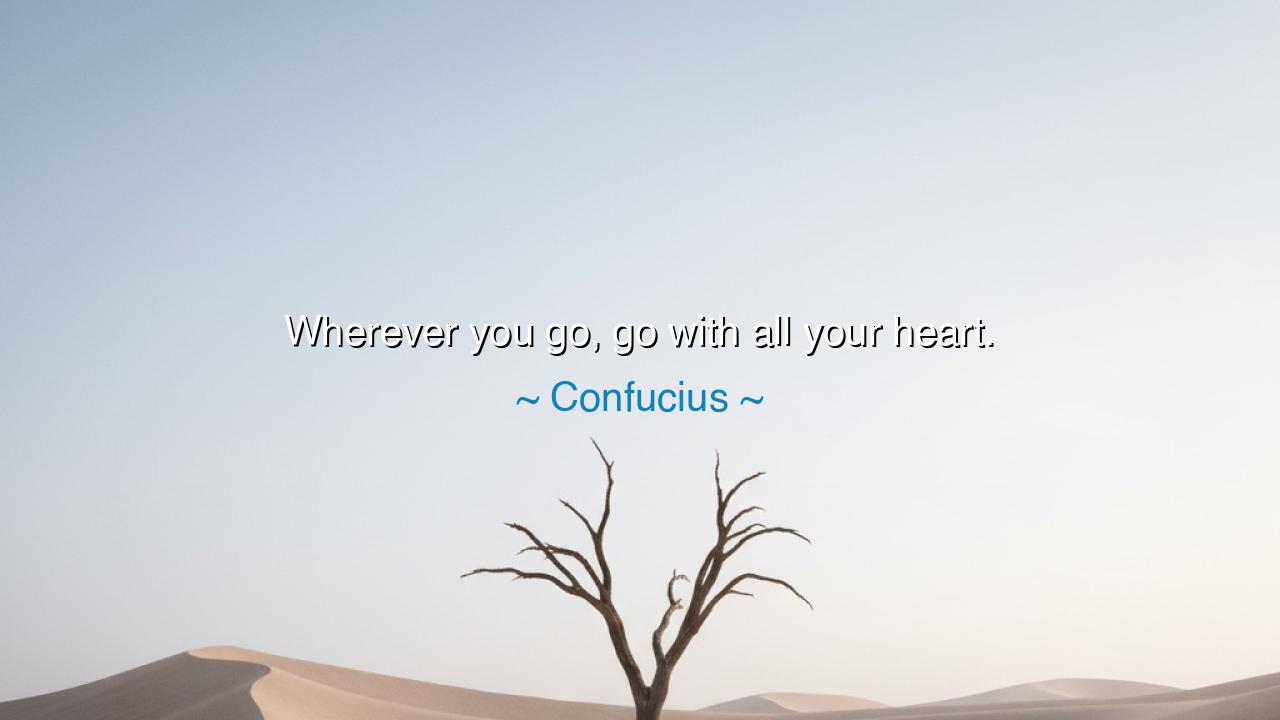
Wherever you go, go with all your heart.






Hear the eternal wisdom of Confucius, the great teacher of the East, who declared: “Wherever you go, go with all your heart.” These words, though simple in form, resound across centuries like the tolling of a sacred bell. They are not a command of the body alone, but a teaching for the soul—that in every path you walk, in every task you undertake, in every journey of life, you must not go half-hearted, but give yourself fully, with sincerity, with presence, with devotion.
The meaning of this teaching is profound. For the world is full of wanderers who move, but do not truly go. They walk with distracted minds, divided intentions, and weary spirits. They arrive at places, but never arrive at themselves. To go with all your heart is to live wholly in the moment, to bring the fullness of your being into the road you choose, so that your journey is not mere travel, but transformation. Without the heart, even the greatest voyage is empty. With the heart, even the smallest step is holy.
Confucius lived in an age of turmoil, when kingdoms clashed and order crumbled. His words were not idle poetry, but guidance for survival in a fractured world. To serve a master, to lead a household, to study the classics—each required more than mere compliance. It required sincerity, a heart poured fully into duty. For he knew that a man divided in spirit cannot build harmony, nor find peace within himself. His command to carry the heart into every path was a call to integrity, to wholeness, to living without division between thought and action.
History offers many examples of this truth. Consider the voyage of Christopher Columbus. Whatever judgment history casts upon his legacy, one cannot deny that he went with all his heart. Against doubt, against fear, against the murmurs of his own sailors, he pressed forward into seas uncharted. It was this fierce, undivided will—his whole heart poured into a single course—that carried him across the ocean to lands unseen by his people. Without such resolve, the sails would have turned back long before the horizon broke. Thus, history teaches us: it is not always brilliance or resources that shape destiny, but the power of a heart wholly committed.
Yet the saying also warns us. To go with only part of the heart is to sow failure before the journey begins. The half-hearted lover cannot keep affection alive. The distracted worker cannot build excellence. The hesitant leader cannot inspire trust. Such dividedness is weakness. Confucius calls us to the opposite: to step forward in fullness, to let every part of our being unite in the task, whether great or small. For when the heart is whole, the path, though difficult, becomes clear.
This teaching is not only for kings and explorers, but for all. When you speak, speak with all your heart, and sincerity will shine in your words. When you labor, labor with all your heart, and the work will carry dignity. When you love, love with all your heart, and it will endure beyond time. Do not scatter yourself across many distractions; be present, be full, be whole. In this way, the smallest of your actions will carry the weight of eternity.
The lesson is clear: live undivided. Do not walk with one foot in the present and the other in regret or fear. Do not give half your love, half your effort, half your soul. Wherever you go, whether to the marketplace or the battlefield, to the schoolroom or the temple, go with all your heart. For the heart is the flame that turns movement into meaning, and without it, life itself becomes hollow.
So let your action be this: the next time you begin a task, pause, and ask yourself—Am I walking this path with my whole heart, or only a piece of it? If only a piece, draw yourself back, gather your strength, and give yourself fully. For in the words of the sage Confucius: “Wherever you go, go with all your heart.” And if you live thus, your journey will never be in vain.






AAdministratorAdministrator
Welcome, honored guests. Please leave a comment, we will respond soon